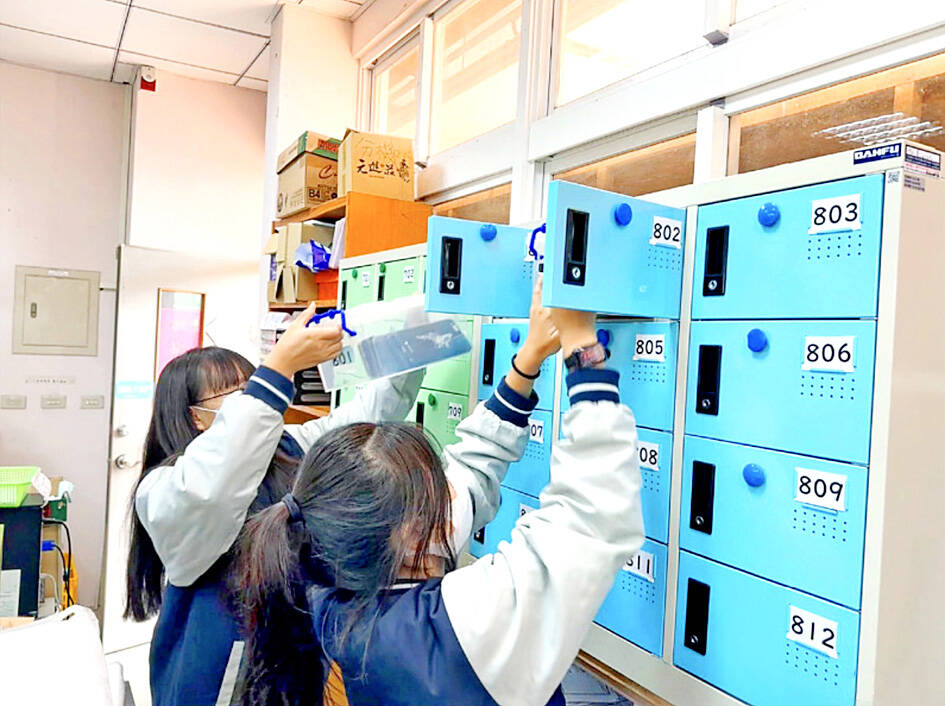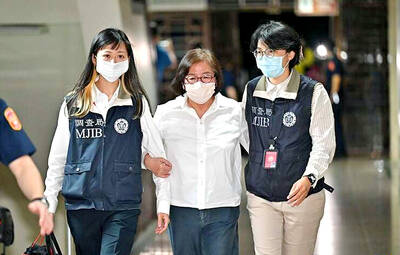Students at National Yuanlin Agricultural and Industrial Vocational High School in Changhua County accused a military instructor of ordering them to allow access to their mobile phones so he could read what they had been posting on social media.
The Ministry of Education on May 14 announced that schools from September are to ban students from bringing mobile devices into classrooms, with some schools — including the Changhua school — implementing the policy early.
School officials told reporters that it had received an order from the ministry to investigate an incident on May 2 based on a complaint from students.

Photo: Hung Mei-hsiu, Taipei Times
The military instructor suspected that students were skirting the ban by handing in a dummy device and secretly taking their main device into the classroom, Chinese-language media reported.
The instructor conducted an inspection, ordering students to go to his office individually, students told reporters.
He ordered them to unlock their phones so that he could view messages, including on Line, as he wanted to check whether the devices were connected to the Internet, the students said.
“The military instructor took a tough stance and spoke forcefully,” one student said. “He told us that if we did not comply, he would contact our parents and punish us.”
Students said that the instructor was targeting girls, as he called in 15 female students and no males.
The military instructor denied targeting girls, saying he conducted the inspection of devices based on student seating numbers.
The inspections were not to delve into private messages, but merely to determine whether the device had been used during class, he said.
“Some students complained, so I stopped the inspection,” he said. “There was no targeting of female students, it just happens that the first 15 seating numbers were all females.”
One female student said that some of the other girls were crying.
“We felt humiliated, because the phones contained secret conversations and private stuff,” she said. “It was not right to invade into our privacy in this manner.”
“We are not criminals and have not done anything wrong,” she said. “The military instructor is not a police officer and has no right to check the contents of our phones.”
School officials said that upon receiving the order from the ministry, they reminded the military instructor to follow school guidelines.
He has been told to be more prudent and respect students’ right to privacy, they said.

Costa Rica sent a group of intelligence officials to Taiwan for a short-term training program, the first time the Central American country has done so since the countries ended official diplomatic relations in 2007, a Costa Rican media outlet reported last week. Five officials from the Costa Rican Directorate of Intelligence and Security last month spent 23 days in Taipei undergoing a series of training sessions focused on national security, La Nacion reported on Friday, quoting unnamed sources. The Costa Rican government has not confirmed the report. The Chinese embassy in Costa Rica protested the news, saying in a statement issued the same

Temperatures in New Taipei City’s Sindian District (新店) climbed past 37°C yesterday, as the Central Weather Administration (CWA) issued heat alerts for 16 municipalities, warning the public of intense heat expected across Taiwan. The hottest location in Taiwan was in Sindian, where the mercury reached 37.5°C at about 2pm, according to CWA data. Taipei’s Shilin District (士林) recorded a temperature of 37.4°C at noon, Taitung County’s Jinfeng Township (金峰) at 12:50 pm logged a temperature of 37.4°C and Miaoli County’s Toufen Township (頭份) reached 36.7°C at 11:40am, the CWA said. The weather agency yesterday issued a yellow level information notice for Taipei, New

Taiwan’s Liu Ming-i, right, who also goes by the name Ray Liu, poses with a Chinese Taipei flag after winning the gold medal in the men’s physique 170cm competition at the International Fitness and Bodybuilding Federation Asian Championship in Ajman, United Arab Emirates, yesterday.

CASE: Prosecutors have requested heavy sentences, citing a lack of remorse and the defendants’ role in ‘undermining the country’s democratic foundations’ Five people affiliated with the Chinese Nationalist Party (KMT), including senior staff from the party’s Taipei branch, were indicted yesterday for allegedly forging thousands of signatures to recall two Democratic Progressive Party (DPP) lawmakers. Those indicted include KMT Taipei chapter director Huang Lu Chin-ru (黃呂錦茹), secretary-general Chu Wen-ching (初文卿) and secretary Yao Fu-wen (姚富文), the Taipei District Prosecutors’ Office said in a news release. Prosecutors said the three were responsible for fabricating 5,211 signature forms — 2,537 related to the recall of DPP Legislator Wu Pei-yi (吳沛憶) and 2,674 for DPP Legislator Rosalia Wu (吳思瑤) — with forged entries accounting for